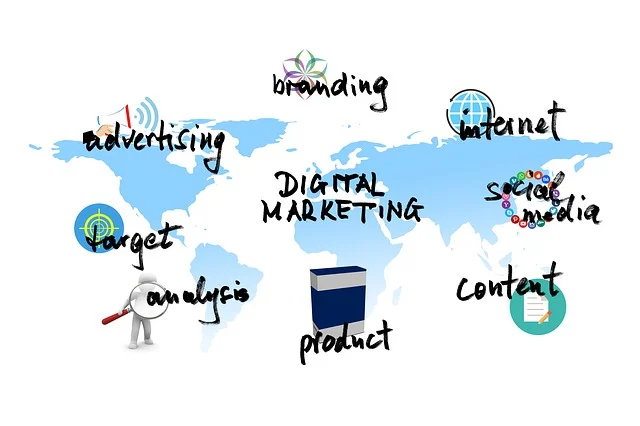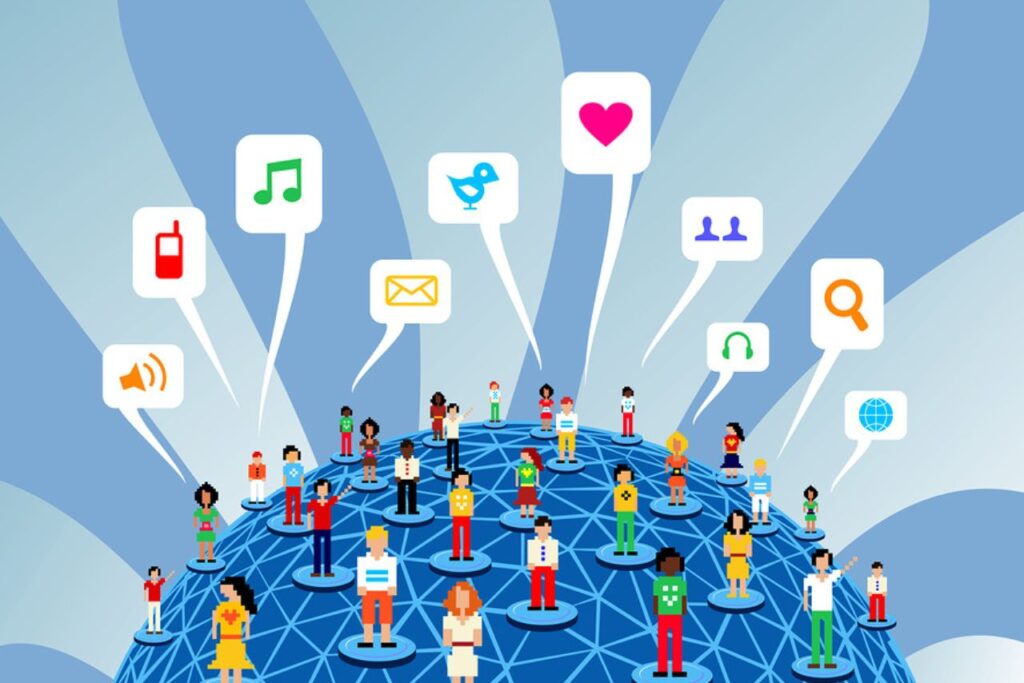

In the fast-changing business landscape of the 21st century, one reality has become crystal clear: digital marketing is no longer optional — it’s essential. Whether you’re a small business owner, a startup founder, or the CEO of an established company, your customers are online, your competitors are online, and your growth opportunities are online.
This guide dives deep into the best digital marketing services for small business — from the fundamentals to advanced strategies — so you can attract more customers, boost revenue, and stay ahead in today’s competitive market.
1. Why Digital Marketing is the Key to Modern Business Growth
1.1 The Shift in Consumer Behavior
Over the past two decades, consumer habits have transformed dramatically:
People now spend over 6 hours a day online.
81% of shoppers research online before making a purchase.
Social media influences over 70% of buying decisions.
The message is clear: businesses that ignore digital channels risk becoming invisible.
1.2 Benefits Digital Marketing Offers
Global Reach – Sell to anyone, anywhere, without the expense of physical expansion.
Precise Targeting – Platforms like Google Ads and Facebook Ads allow targeting by location, demographics, interests, and even behavior.
Cost Efficiency – Digital ads can be launched for as little as a few hundred rupees, reaching thousands of potential customers.
Measurable Results – Real-time analytics mean you can track every click, lead, and sale.
24/7 Marketing – Your campaigns keep working even while you sleep.
2. Understanding Business Growth in a Digital Context
2.1 What Counts as “Business Growth”
Traditionally, business growth was measured by revenue and market share.
In the digital era, we also look at:
Brand visibility online.
Website traffic volume.
Social media engagement rates.
Customer retention and lifetime value.
2.2 Key Growth Metrics
To measure growth effectively, track:
Website Traffic – Quantity and quality of visitors.
Conversion Rate (CR) – Percentage of visitors who take desired actions.
Customer Acquisition Cost (CAC) – The cost of gaining one new customer.
Return on Marketing Investment (ROMI) – Profit generated from marketing spend.
Customer Lifetime Value (CLV) – Total revenue a customer brings over their relationship with your business.
3. Core Digital Marketing Strategies That Drive Growth
Digital marketing isn’t a single tactic — it’s a combination of integrated strategies. Here’s how each works and why they matter.
3.1 Search Engine Optimization (SEO)
SEO is the foundation of long-term digital growth.
On-Page SEO: Optimizing page titles, headings, keywords, and meta descriptions.
Off-Page SEO: Building backlinks, guest posting, and online PR.
Technical SEO: Improving site speed, security, and mobile-friendliness.
Example:
A travel agency optimized its blog for “best honeymoon destinations” and ranked on page 1 of Google, generating 500+ organic leads per month.
3.2 Content Marketing
Content attracts, educates, and nurtures potential customers.
Blog posts – Establish expertise.
Videos – Show product benefits in action.
Podcasts – Build personal connection.
E-books & Guides – Capture leads.
Pro Tip: Create evergreen content that stays relevant for years.
3.3 Social Media Marketing (SMM)
Social media is your brand’s storytelling platform.
Use Instagram for visual branding.
Use LinkedIn for B2B networking.
Use TikTok for trend-driven engagement.
Case Study:
A clothing brand used Instagram Reels with trending audio to showcase new arrivals — resulting in a 35% jump in sales in one month.
3.4 Pay-Per-Click Advertising (PPC)
PPC gives immediate visibility.
Google Search Ads target active buyers.
Display Ads build awareness.
Remarketing Ads re-engage past visitors.
Tip: Always monitor ROI — PPC works best when paired with good landing pages.
3.5 Email Marketing
Email remains a conversion powerhouse.
Welcome series for new subscribers.
Weekly newsletters with tips, offers, and updates.
Cart abandonment emails to recover lost sales.
3.6 Influencer Marketing
Influencers provide instant trust.
Micro-influencers (5k–50k followers) often deliver higher engagement.
Partner with influencers who truly use your product.
4. Building a Digital Marketing Growth Plan
4.1 Step 1 – Set SMART Goals
Specific, Measurable, Achievable, Relevant, Time-bound.
Example: “Increase qualified leads by 30% in 6 months.”
4.2 Step 2 – Identify Your Audience
Create buyer personas:
Age, gender, occupation.
Pain points and motivations.
Preferred platforms.
4.3 Step 3 – Choose the Right Channels
Don’t spread yourself too thin. Focus on 2–3 channels that bring the highest ROI.
4.4 Step 4 – Budget Allocation
Divide funds strategically:
SEO (long-term growth)
PPC (quick wins)
Social media content
5. Tools That Accelerate Digital Growth
Google Analytics – Track and measure traffic.
SEMrush / Ahrefs – Keyword and competitor research.
Canva – Easy graphic design.
Mailchimp / HubSpot – Email automation.
Hootsuite – Social media scheduling.
6. Advanced Growth Tactics
6.1 Marketing Automation
Automate repetitive tasks like email sequences, lead scoring, and follow-ups.
6.2 Conversion Rate Optimization (CRO)
Small design changes to landing pages can boost conversions by 20% or more.
6.3 Retargeting Campaigns
Show ads to visitors who didn’t purchase — often cheaper and more effective than new leads.
7. Common Digital Marketing Mistakes
Ignoring analytics.
Skipping mobile optimization.
Posting without a content plan.
Focusing only on sales instead of value.
8. Industry-Specific Digital Growth Strategies
8.1 For eCommerce
Product videos.
Instagram shopping features.
Abandoned cart recovery emails.
8.2 For B2B
LinkedIn lead generation ads.
Webinars and case studies.
Whitepapers for authority.
8.3 For Local Businesses
Google Business Profile optimization.
Local SEO keywords.
Customer review campaigns.
9. Case Studies: Growth in Action
Case Study 1 – Restaurant Chain
Used geo-targeted Facebook Ads and Instagram Stories to promote lunch deals, increasing foot traffic by 50% in two months.
Case Study 2 – SaaS Startup
Combined SEO blog posts, PPC ads, and LinkedIn outreach to grow from 200 to 2,000 paying users in one year.
10. Future Trends to Watch
AI-powered personalization – Chatbots, tailored ads.
Voice search optimization – Prepare for smart speakers.
AR and VR marketing – Virtual try-on experiences.
Short-form video dominance – TikTok, Instagram Reels.
Conclusion
Unlocking business growth with digital marketing isn’t about chasing trends blindly — it’s about building a sustainable, data-driven strategy. The businesses that thrive online are those that:
Understand their audience deeply.
Deliver consistent value.
Adapt quickly to changes.
Using the best business growth strategies, gives you the tools to reach more people, convert them faster, and retain them longer — all at a lower cost than traditional methods.
The question is no longer “Should I use digital marketing?” — it’s “How soon can I start?”
FAQ’s
1. What is digital marketing, and how can it help my business grow?
Business growth with digital marketing is achieved by using strategies like SEO, social media, paid ads, and email marketing to reach your target audience, generate leads, and increase sales, ensuring sustainable long-term results.
2. How long does it take to see results from digital marketing?
The timeline for business growth with digital marketing depends on your strategy, competition, and industry. Paid ads can deliver quick wins, while SEO usually takes 3–6 months for visible results.
3. Is digital marketing suitable for small businesses?
Yes. Business growth with digital marketing allows small businesses to compete with larger brands by using cost-effective strategies that level the playing field.
4. Which digital marketing services are best for business growth?
For effective business growth with digital marketing, SEO, PPC ads, content marketing, social media, and email campaigns are highly recommended. The right mix depends on your goals.
5. How much should I invest in digital marketing?
Your budget for business growth with digital marketing should align with your revenue, typically ranging from 5–15%, based on ROI expectations and industry standards.
6. Can I manage digital marketing on my own?
While basic posting can be done independently, professional business growth with digital marketing requires expertise in analytics, optimization, and strategy for lasting results.
7. How will I measure the success of my digital marketing efforts?
The success of business growth with digital marketing can be measured through metrics like traffic, conversions, lead generation, and ROI using tools such as Google Analytics.
8. What’s the difference between SEO and PPC for business growth?
Both SEO and PPC are essential for business growth with digital marketing — SEO builds long-term visibility, while PPC offers instant traffic and quick results.
9. How can social media marketing help my business grow?
Social media boosts brand awareness, engages audiences, and drives traffic — all contributing to business growth with digital marketing strategies.
10. Will digital marketing work for my niche industry?
Yes. Business growth with digital marketing works for niche industries by targeting the right audience with personalized campaigns and messaging.
11. Do I need a website to start digital marketing?
While not mandatory, a website enhances credibility and acts as the central hub for business growth with digital marketing campaigns.
12. How often should I update my digital marketing strategy?
For consistent business growth with digital marketing, review and update your strategy at least every quarter to adapt to changing trends.
13. What role does content play in business growth?
Content is at the heart of business growth with digital marketing, as it educates audiences, builds trust, and improves search rankings.
14. Can digital marketing help me reach international customers?
Yes. Business growth with digital marketing can expand your reach globally using targeted ads, localized content, and multilingual strategies.
15. How does email marketing contribute to growth?
Email marketing nurtures leads, drives repeat purchases, and supports overall business growth with digital marketing efforts.
16. Is influencer marketing effective for business growth?
If executed strategically, influencer partnerships can significantly boost brand awareness and sales, fueling business growth with digital marketing.
17. What’s the first step to start digital marketing for my business?
Begin business growth with digital marketing by setting clear goals, identifying your audience, and building a strategy tailored to your needs.


Penned by Anushka
Edited by Anushka, Research Analyst
For any feedback mail us at [email protected]
Transform Your Brand's Engagement with India's Youth
Drive massive brand engagement with 10 million+ college students across 3,000+ premier institutions, both online and offline. EvePaper is India’s leading youth marketing consultancy, connecting brands with the next generation of consumers through innovative, engagement-driven campaigns. Know More.
Mail us at [email protected]